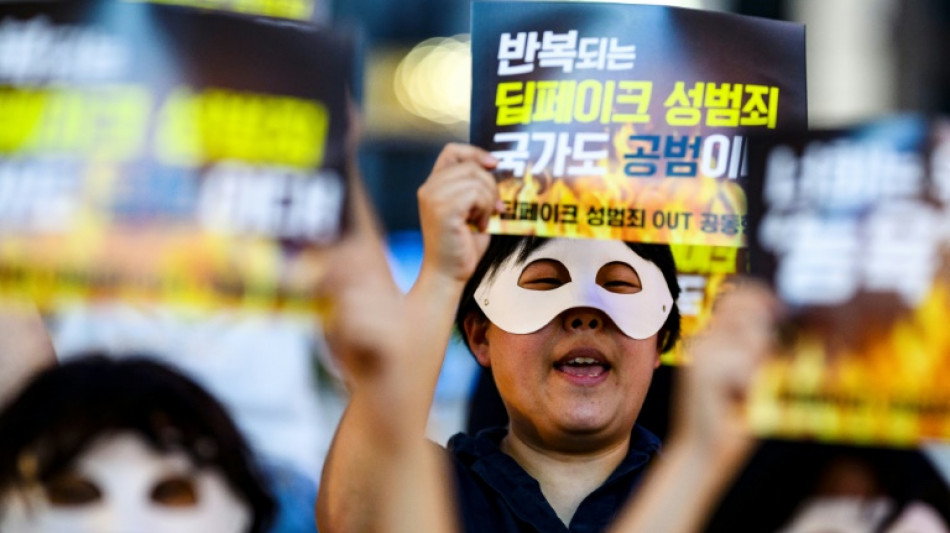
-
 UK imposes online entry permit on European visitors
UK imposes online entry permit on European visitors
-
How a Brazilian chief is staving off Amazon destruction

-
 Meme politics: White House embraces aggressive alt-right online culture
Meme politics: White House embraces aggressive alt-right online culture
-
China launches military drills in Taiwan Strait

-
 US senator smashes record with 25-hour anti-Trump speech
US senator smashes record with 25-hour anti-Trump speech
-
Brazil binman finds newborn baby on garbage route

-
 US senator smashes record with marathon anti-Trump speech
US senator smashes record with marathon anti-Trump speech
-
Trump advisor Waltz faces new pressure over Gmail usage

-
 Niger junta frees ministers of overthrown government
Niger junta frees ministers of overthrown government
-
Trump set to unleash 'Liberation Day' tariffs

-
 Boeing chief to acknowledge 'serious missteps' at US Senate hearing
Boeing chief to acknowledge 'serious missteps' at US Senate hearing
-
Real Madrid hold Real Sociedad in eight-goal thriller to reach Copa del Rey final

-
 Nuno salutes 'special' Elanga after stunning strike fires Forest
Nuno salutes 'special' Elanga after stunning strike fires Forest
-
PSG survive scare against Dunkerque to reach French Cup final

-
 Sundowns edge Esperance as crowd violence mars quarter-final
Sundowns edge Esperance as crowd violence mars quarter-final
-
Nottingham Forest beat Man Utd, Saka scores on Arsenal return

-
 Elanga wonder-goal sinks Man Utd as Forest eye Champions League berth
Elanga wonder-goal sinks Man Utd as Forest eye Champions League berth
-
Stock markets mostly advance ahead of Trump tariffs deadline

-
 US movie theaters urge 45-day 'baseline' before films hit streaming
US movie theaters urge 45-day 'baseline' before films hit streaming
-
Saka scores on return as Arsenal beat Fulham

-
 Third-division Bielefeld shock holders Leverkusen in German Cup
Third-division Bielefeld shock holders Leverkusen in German Cup
-
Ball-blasting 'Torpedo bats' making waves across MLB opening weekend

-
 Newsmax shares surge more than 2,000% in days after IPO
Newsmax shares surge more than 2,000% in days after IPO
-
Thousands of Hungarians protest against Pride ban law

-
 GM leads first quarter US auto sales as tariffs loom
GM leads first quarter US auto sales as tariffs loom
-
Tesla sales tumble in Europe in the first quarter

-
 No 'eye for an eye' approach to US tariffs: Mexico
No 'eye for an eye' approach to US tariffs: Mexico
-
NFL club owners back dynamic kickoffs, delay tush push vote

-
 Trump 'perfecting' new tariffs as nervous world braces
Trump 'perfecting' new tariffs as nervous world braces
-
Trump nominee says to press UK on Israel arms

-
 French court says Le Pen appeal ruling could come before presidential vote
French court says Le Pen appeal ruling could come before presidential vote
-
The battle to control assets behind Bosnia crisis

-
 Prabhsimran powers Punjab to IPL win over Lucknow
Prabhsimran powers Punjab to IPL win over Lucknow
-
Mass layoffs targeting 10,000 jobs hit US health agencies

-
 Tiger's April Foolishness: plan to play Masters just a joke
Tiger's April Foolishness: plan to play Masters just a joke
-
Myanmar quake toll passes 2,700, nation halts to honour victims

-
 Turkish fans, artists urge Muse to cancel Istanbul gig
Turkish fans, artists urge Muse to cancel Istanbul gig
-
US seeks death penalty for accused killer of insurance CEO

-
 UK govt moves to block sentencing guidelines for minority defendants
UK govt moves to block sentencing guidelines for minority defendants
-
Trump puts world on edge as 'Liberation Day' tariffs loom

-
 Swedish journalist jailed in Turkey kept 'isolated': employer
Swedish journalist jailed in Turkey kept 'isolated': employer
-
Stock markets advance ahead of Trump tariffs deadline

-
 Gulf between Everton and Liverpool has never been bigger, says Moyes
Gulf between Everton and Liverpool has never been bigger, says Moyes
-
Finland to withdraw from anti-personnel mine ban treaty

-
 UK vows £20 million to boost drone and 'flying taxi' services
UK vows £20 million to boost drone and 'flying taxi' services
-
Ford's US auto sales dip in first quarter as tariffs loom

-
 Digging for box office gold, 'A Minecraft Movie' hits cinemas
Digging for box office gold, 'A Minecraft Movie' hits cinemas
-
Southampton boss Juric desperate to avoid Premier League 'worst team' tag

-
 Thailand rescue dogs double as emotional support
Thailand rescue dogs double as emotional support
-
Five takeaways from Marine Le Pen verdict


Deepfake porn crisis batters South Korea schools
After South Korean authorities uncovered a sprawling network of AI deepfake porn Telegram chatrooms targeting schools and universities, teenage activist Bang Seo-yoon began collecting testimony of abuse from victims.
Many of the cases she documented followed the same pattern: schoolboys steal innocuous selfies from private Instagram accounts and create explicit images to share in the chat rooms, specifically to humiliate female classmates -- or even teachers.
Super-wired South Korea, with the world's fastest average internet speeds, has long battled sexual cyber violence, but experts say a toxic combination of Telegram, AI tech, and lax laws has supercharged the issue -- and it is tearing through the country's schools.
"It's not just the harm caused by the deepfake itself, but the spread of those videos among acquaintances that is even more humiliating and painful," Bang, 18, told AFP.
She has received thousands of reports from devastated victims since authorities in August found the first such Telegram chatrooms, typically set up within a school or university to prey on female students and staff.
Most perpetrators are teens, police say.
Deepfake prevalence is increasing exponentially globally, industry data shows, up 500 percent on year in 2023, cybersecurity startup Security Hero estimates, with 99 percent of victims women -- typically famous singers and actresses.
But while celebrities have powerful backers to protect them -- the K-pop agency behind girlband NewJeans recently took legal action against deepfake porn -- many ordinary victims are struggling to get justice, activists say.
- 'Live in fear' -
Prosecution rates are woeful: between 2021 and July this year, 793 deepfake crimes were reported but only 16 people were arrested and prosecuted, according to police data obtained by a lawmaker.
After news of the chat rooms spread, complaints surged, with 118 cases reported in just five days in late August, and seven people arrested amid a police crackdown.
But six out of seven alleged perpetrators were teenagers, police say, which complicates prosecutions as South Korean courts rarely issue arrest warrants for minors.
The chatrooms, multiple of which AFP attempted to join before being removed by moderators, have lewd names such as "the lonely masturbator" and rules requiring members to post photos of women they wish to see "punished".
Victims find themselves "sexually insulted and mocked by their classmates in online spaces", Kang Myeong-suk, head of victim support at the Women's Human Rights Institute of Korea told AFP.
"But the perpetrators often face no consequences," she said, adding that victims now "live in fear of where their manipulated images might be distributed by those around them".
"Some online comments say the victims should 'get over it' as these deepfake images are not even real," Kang said.
"But just because manipulated images aren't real doesn't mean the pain the victims endure is any less genuine."
- Victim blaming -
While overall crime rates in South Korea are generally low, the country has long suffered from an epidemic of spy-cam crimes, which led to major protests in 2018 inspired by the global #MeToo movement, eventually forcing lawmakers to strengthen laws.
Even so "the penalties issued are often trivial, like fines or probation, which are disproportionate to the gravity of the offenses", professor Yoon Kim Ji-young told AFP.
There have also been Telegram porn scandals before, most notably in 2020 when a group blackmailing women and girls to make sexual content for paid chatrooms was uncovered. The ringleader was jailed.
But things have not improved.
President Yoon Suk Yeol's dismissive views on feminism -- which he has blamed for the country's low birthrate -- have signalled to men it is "okay to be hostile or discriminatory towards women", Yoon Kim said.
South Korean police blame low prosecution rates on Telegram, which is famed for its reluctance to cooperate with authorities. Its founder was recently arrested in France for failing to curb illegal content on the app.
But one victim of a 2021 deepfake porn incident told AFP that this was no excuse -- many victims manage to identify their attackers themselves simply by determined sleuthing.
The victim, who requested anonymity, said it had been a "huge trauma" to bring her assailant to justice after she was attacked in 2021 with a barrage of Telegram messages containing deepfake images showing her being sexually assaulted.
Her attacker was a fellow student at the prestigious Seoul National University, who she had rarely interacted with but always thought was "gentle".
"It was hard to accept," she said, adding police required her to collect all the evidence herself, then she had to lobby hard for a trial, which is now ongoing.
"The world I thought I knew completely collapsed," she said in a letter she plans to submit to the court on September 26.
"No one should be treated as an object or used as a means to compensate for the inferiority complexes of individuals like the defendant, simply because they are women."
H.E.Young--AMWN



